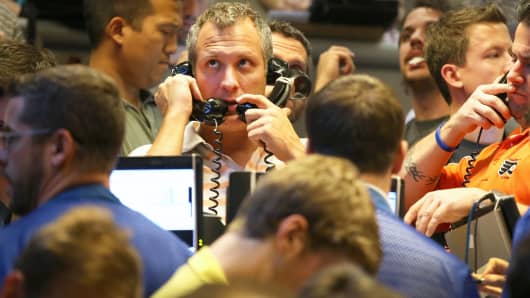That technology has become too large a part of the S&P 500 is clear to all. At 26 percent of the index, it is a much larger component than weightings in the Russell 2000 (15 percent), the S&P Mid Cap (16 percent) or Small Cap (15 percent). But what can an index committee do in the face of seemingly endless investor appetite for mega-cap tech names?
The answer is simplicity itself: Move some heavyweight tech names and a smattering of consumer stocks (for more diversification) into another industry classification. That's exactly what is happening in September. While that may seem like a long way off, we prefer to highlight issues like this earlier rather than later.
Here is what is happening:
- The Telecomm sector is being renamed communication services.
- On September 21 (and the 28th for various MSCI Indices), 23 names will move from the S&P 500 Consumer Discretionary sector (16 stocks) and Tech sector (6 stocks) to this new group.
- The names remaining in the "old" Tech and Consumer Discretionary sectors will see reweighting (higher) to make up for the deletion of stocks moving to the sector.
- As of pricing at the beginning of August, the new Communications Services sector will have a 57 percent weighting in what is currently Technology, 32 percent in Consumer Discretionary and 11 percent in Telecomm. It will be about 10 percent of the S&P 500 versus just 2 percent right now.
- There is already an exchange-traded fund that tracks the new sector; XLC is the symbol.
Three keys to the big tech-stock moves
Digging down into the specific names involved in this shift and the stock composition of the new sector, there are three things to know:
1. Alphabet (GOOG/GOOGL) and Facebook are both moving to Comm Services from Technology. So are three smaller names: Activision (ATVI), Electronic Arts (EA) and Take Two (TTWO).
Facebook's weighting in the new sector is 18.4 percent; GOOG/GOOGL is a combined 25.8 percent. Activision (4.5 percent) and Electronic Arts (4.2 percente) also have notable weightings.
2. From Consumer Discretionary, the important names shifting to Comm Services are Disney and Comcast (both 5 percent weightings in the new sector). Netflix (3.9 percent) is also in the mix here, as are Twitter (2.2 percent) and CBS (1.9 percent).
3. With all due respect to the folks at S&P Dow Jones Indices, the new Communication Services sector is an odd construction. Specifically:
- Two companies — Google and Facebook — are 44.2 percent of the sector by weighting.
- Four companies (adding Comcast and Disney) represent 52 percent of the sector. This will only grow once Disney completes its purchase of 21st Century Fox (a 3.0 percent weighting) early next year.
- The top 10 positions (nine companies) are 77 percent of the sector.
- As concentrated as the current S&P Technology sector may look, the top two names (Apple and Microsoft) are only 26.6 percent of the group. The top 10 positions are just 61 percent.
- Even the current Consumer Discretionary sector, dominated by Amazon (23.7 percent weight), has less exposure to its top 10 names (62.8 percent) than the new Communication Services group.
The upshot here is that Communication Services may not be as attractive an investment vehicle as the "old" Tech and Consumer Discretionary groups, and that has important implications because of the ETFs/"passive" assets that track these sectors.
Why these big moves matter for the classic tech ETFs
A few points here:
- The Technology Sector SPDR Fund (XLK) currently has $22.7 billion in assets under management. The Consumer Discretionary Select Sector SPDR (XLY) has $13.9 billion in AUM. By contrast, the new Comm Services ETF (XLC) has just $365 million.
- This means that on rebalancing day (September 21st), XLK and XLY will be large net sellers of: Facebook (8 million shares based on current AUM), Alphabet (2 million shares of each stock), Disney (6.7 million shares) and Comcast (20.8 million shares). The one saving grace: in all cases these amounts are less than one day's trading, although there are smaller ETFs that also track these indices. Worth noting: we haven't included any other passive vehicles, so the share amounts could well be 2-3x larger than noted.
- Given the top-heavy nature of the Comm Services sector, it seems hard to believe that it will be as popular with RIA, family offices, and retail investors as XLK and XLY. That will reduce the effect of "passive" money flows on the names now consigned to the new sector. For example, XLK has seen $1.3 billion of inflows for 2018 YTD.
- As an aside for readers who own XLY (Consumer Discretionary): Amazon is already 23.7 percent of the index tracked by this ETF. Once you exclude Disney and Comcast, and even adjusting for EBAY's inclusion, this weighting will likely top 25 percent.
This has been a grimy, technical note so one big picture thought to close it out: Tech's dominance at the top of the US equity market cap table is a real issue here. The S&P Dow Jones Indices committee faces the same problem as investors – how do you manage diversification when Tech is eating the world? Be prepared to hear a lot of "this must be the top in Tech" as more market commentary focuses on the issues we've presented here.
—By Nicholas Colas, co-founder of DataTrek Research






















